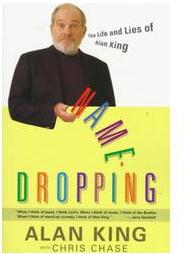Alan King’s “Name Dropping” CORRECTED
 Both Halves of the Staff are reading Alan King’s autobio, “Name-Dropping,” (with Chris Chase). It’s good, fluffy summer reading and, as far as the title goes, it delivers.
Both Halves of the Staff are reading Alan King’s autobio, “Name-Dropping,” (with Chris Chase). It’s good, fluffy summer reading and, as far as the title goes, it delivers.
But, since King was born the day after Christmas 1926, be prepared to catch names that belong mostly to long-dead giants of the industry.
King started performing at a very early age, during the depression, in NYC and later in the Catskills, so a lot of his stories involve Jolson, Cantor, Berle, George Burns and, in this excerpt, Joe E. Lewis:
In 1949, I was appearing at the Paramount (the last of the big New York movie houses that stilled featured vaudeville) on a bill with Billy Eckstine, when I got a call from Joe E. He needed a favor. He was stuck in Chicago and couldn’t get home in time to do a benefit that night. “Can you make an appearance for charity?” he asked me. “It’s at the Astor Hotel, you’re four steps away.”
I’d never turned Joe E. down, but it was a Saturday; we did six shows at the Paramount on Saturday, so I was not in the best frame of mind to do a benefit.
I came offstage, walked across the street to the Astor Ballroom, and said to the stage manager, “Listen, I’ve got an hour and a half between shows. If I con’t go on now, I can’t go on at all.” So the bandleader interrupts the dinner: “Ladies and gentlemen, direct from the Paramount Theater, Alan King.”
I do a half an hour and go back to my dressing room at the Paramount. The phone rings. It’s Joe E. “What the hell happened? Where were you?”
“What do you mean, where was I? I just did half an hour at the Astor Ballroom”
“Schmuck!” Joe E. yells. “It was the Astor Roof!” I’d done half an hour in the wrong room.
Speaking of Joe E. Lewis, we coincidentally were able to watch the first half of the 1957 movie made from Lewis’ autobiography, “The Joker Is Wild,” starring Frank Sinatra. Sinatra was the absolute wrong person to star in the pic because he seems to be (and quite possibly could actually be) totally, utterly humorless. This is an impairment, especially when portraying a man who was one of the most recognized comedians of the middle third of the last century. Hey, it was 1957 and Frank was hot.
King’s career started early (in the Catskills at the age of 15) and lasted 60 years. And his middle and later work was featured on network television, on HBO and in such contemporary films as “Memories of Me,” “Sunshine State” and “Night and the City.” King was a rare figure in that he was familiar to several generations of comedy fans. He straddled the old school and the new. He freely admits to having stolen most or all of his material when he was starting out– very old school. But his specials from the 70s and 80s were constructed from original material, if not always material that was warmly received by the MSM. (Click for a 1987 NYT review by John J. O’Connor with a paragraph that begins with “Like many comedians, Mr. King is fascinated with himself.”)
We still fondly recall King’s “Survived by his wife!” bit from one of his specials. It was maybe 1987.
The Male Half had the pleasure of meeting King, in rather odd circumstances. TMHOTS was among three Philly comics summoned to the studios of KYW in Philadelphia one early weekday morning, in 1985 for the purpose of appearing on that station’s “People Are Talking,” then hosted by Maury Povich. King was on the talk circuit, promoting his book, “Is Salami and Eggs Better Than Sex? Memoirs of a Happy Eater”
The premise was that, after King was done plugging his book, the three comics would each go up and do a minute or two in front of the studio audience, while King watched from the side. The master comic would then critique each performance. King was extremely gracious when it came to evaluating The Male Half’s set. Says The Male Half:
He said I was “an egghead comic,” (his exact words) who employed slightly high-brow material and that my audience had better be alert. He also pointed out, rather astutely, that I must be accustomed to working nightclubs and comedy clubs because, at the end of my set, at 7 in the morning, I said, “Thank you very much, good night.” A review of the tape proves King to be correct.
Not every old school comedian would have been as accomodating as King was that day.
One other noteworthy slice from the book:
I was so blessed to have watched him (Joe E. Lewis), to have watched the whole cast of characters who were the Friars. It was an incredible time, and though I don’t know if I was realized that I was learning, I absorbed by osmosis the lessons they taught. Each one had his own trick, a nuance, a personal way of doing things. Some of these people were even bigger than the stories about them.[…]
Today, there are a lot of wonderful young comedians who make me laugh, but the ones I like best have a sense of history and tradition. Richard Pryor, Billy Crystal and Robin Williams, they don’t get into bed at night saying, “Today, I invented show business.”
Reply to: Alan King’s “Name Dropping” CORRECTED





